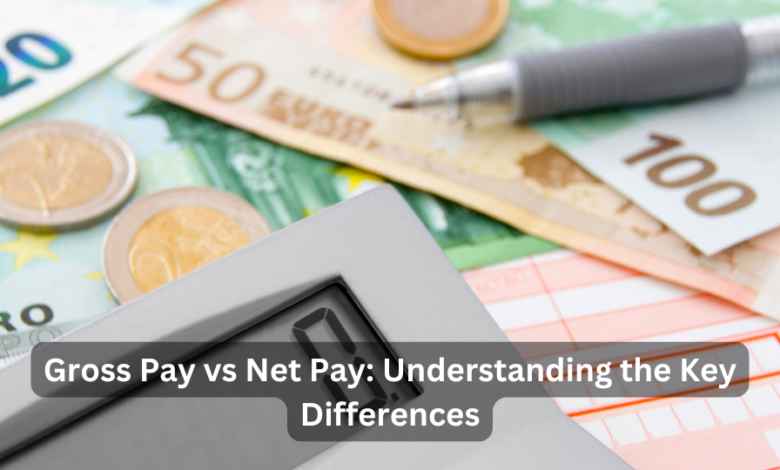Gross Pay vs Net Pay: Understanding the Key Differences

When it comes to understanding your paycheck, two terms often come up: gross pay and net pay. While both are related to your earnings, they represent different amounts and have a significant impact on your financial planning. In this comprehensive guide, we’ll break down the key differences between gross and net pay, explain the factors that affect each, and provide examples to help you navigate your finances more effectively.
What Is Gross Pay?
Gross pay is the total amount of money an employee earns before any deductions are made. This figure includes your base salary, overtime pay, bonuses, and any other compensation. It’s often referred to as the “pre-tax” income because it reflects the amount before taxes and other mandatory deductions.
For instance, if your annual salary is $50,000 and you don’t receive any other forms of compensation, your gross pay for the year would be $50,000. If you are paid monthly, your gross monthly pay would be $4,166.67. However, if you work overtime or receive bonuses, these amounts would also be included in your gross pay.
Components of Gross Pay:
- Base Salary: This is your agreed-upon salary based on your employment contract.
- Overtime Pay: Compensation for working beyond regular hours. Typically calculated at 1.5 times or 2 times the regular hourly rate.
- Bonuses: Additional pay based on performance, achievements, or company profits.
- Commissions: Pay based on the sales or services you have provided.
- Benefits and Allowances: Some non-cash benefits, such as housing or car allowances, may also be included in gross pay.
It’s essential to understand that your gross pay is not what you take home at the end of the day. Net pay is the amount you receive after deductions, and that’s what you can spend or save.
What Is Net Pay?
Net pay, also known as take-home pay, is the amount of money you actually receive after all deductions, taxes, and contributions have been subtracted from your gross pay. This is the money deposited into your bank account or handed to you in your paycheck.
For example, if your gross monthly pay is $4,166.67 but after taxes, health insurance, retirement contributions, and other deductions, you take home $3,200, your net pay is $3,200.
Deductions That Affect Net Pay:
- Federal Income Tax: A portion of your gross pay is withheld based on your tax bracket. The U.S. has a progressive tax system, meaning the more you earn, the higher the percentage of your income goes to taxes.
- State and Local Taxes: Many states and cities impose their own taxes. These vary widely by location, with some states like Florida and Texas not having any income tax, while others like California have significant state tax rates.
- Social Security and Medicare (FICA): Employees and employers contribute to Social Security and Medicare through FICA taxes. In 2024, the Social Security tax rate for employees is 6.2% on wages up to $160,200, while the Medicare tax rate is 1.45% with no wage limit.
- Health Insurance Premiums: If you’re enrolled in an employer-sponsored health plan, your share of the premiums is deducted from your paycheck.
- Retirement Contributions: Many employers offer 401(k) or similar retirement plans. Contributions to these plans are often tax-deferred, meaning they reduce your taxable income but also reduce your take-home pay.
- Union Dues: If you are part of a union, your dues will be deducted directly from your paycheck.
- Other Benefits: Additional benefits, such as life insurance, disability insurance, or flexible spending accounts, also contribute to reducing your gross pay to net pay.
Gross Pay vs Net Pay: A Detailed Example
Let’s consider an example to better illustrate the difference between gross pay and net pay.
- Annual Gross Salary: $60,000
- Monthly Gross Pay: $5,000
Deductions:
- Federal Income Tax: $600
- State Income Tax: $200
- Social Security: $310
- Medicare: $72.50
- Health Insurance: $200
- 401(k) Contribution: $400
Net Pay Calculation:
| Deduction | Amount |
|---|---|
| Federal Income Tax | $600 |
| State Income Tax | $200 |
| Social Security | $310 |
| Medicare | $72.50 |
| Health Insurance | $200 |
| 401(k) Contribution | $400 |
Total Deductions: $1,782.50
Net Pay: $5,000 – $1,782.50 = $3,217.50
In this case, even though the gross pay is $5,000, the net pay received is $3,217.50 after all deductions.
Why Gross Pay and Net Pay Matter
Understanding the distinction between gross pay and net pay is essential for financial planning. While gross pay gives you a sense of your earning potential, it’s the net pay that determines how much money you have available to cover living expenses, save for the future, and invest. Focusing only on gross pay can give you a distorted view of your financial situation.
- Budgeting: When creating a budget, always use your net pay as the baseline. This ensures that your spending does not exceed what you actually bring home.
- Negotiating Salary: When negotiating a salary, it’s crucial to account for the deductions that will impact your net pay. Even if you receive a raise, higher taxes and additional deductions could mean only a modest increase in take-home pay.
- Tax Planning: Understanding gross and net pay can help with tax planning. By maximizing deductions and tax-advantaged contributions, you can minimize your tax liability and increase your net pay.
How to Increase Your Net Pay
If you feel that your net pay is lower than expected, there are several strategies to boost your take-home pay:
- Increase Pre-tax Contributions: Contributions to 401(k) or Health Savings Accounts (HSA) reduce your taxable income, meaning you pay less in taxes and potentially keep more of your money.
- Review Your Tax Withholding: If you’re receiving a large tax refund, it may be worth reviewing your tax withholding with your employer. By adjusting your W-4 form, you can have less tax withheld and increase your net pay throughout the year rather than receiving it as a lump sum in the form of a refund.
- Negotiate for Employer-Paid Benefits: Many employers offer flexible spending accounts, health insurance, and other benefits that can reduce your taxable income. Employer-paid health premiums can increase your net pay without costing you extra.
- Maximize Tax Credits: If you’re eligible for tax credits like the Earned Income Tax Credit (EITC), you can reduce your tax liability and keep more of your earnings.
Impact of Bonuses on Gross and Net Pay
Bonuses are often seen as an exciting financial boost, but it’s important to understand how they impact both your gross and net pay. Since bonuses are usually taxed at a higher rate than regular wages, your net pay from a bonus may be much less than expected.
For example, if you receive a $10,000 bonus, and your employer withholds 22% in taxes, your net pay from the bonus would only be $7,800. If your gross bonus pushes you into a higher tax bracket, you could be subject to even more withholding. Be sure to plan accordingly if you’re expecting a large bonus.
Gross Pay vs Net Pay: Frequently Asked Questions
1. Why is my net pay much lower than my gross pay? Your net pay is lower because of mandatory deductions like federal and state taxes, Social Security, Medicare, and other benefits such as health insurance and retirement contributions.
2. How can I estimate my net pay? There are numerous online calculators that allow you to input your gross pay and deductions to estimate your net pay. These tools factor in tax rates, retirement contributions, and other common deductions to give you a clearer picture of your take-home pay.
3. Do all employees have the same deductions? No, deductions vary based on factors like location, marital status, tax withholdings, benefits, and retirement contributions. Self-employed individuals, for example, pay both the employee and employer portions of FICA taxes.
4. Is net pay the same as taxable income? No, taxable income is your gross pay minus allowable deductions like 401(k) contributions, HSA contributions, and certain business expenses. Net pay is what you actually take home after taxes and all other deductions have been made.
Conclusion
Understanding the difference between gross pay and net pay is crucial for both short-term financial management and long-term planning. While gross pay gives you a full picture of your earnings, net pay is the amount you truly have to work with. By learning how to manage deductions, plan for taxes, and maximize pre-tax benefits, you can improve your financial health and make informed decisions that align with your personal and professional goals.
For more insights on maximizing your take-home pay and understanding the intricacies of deductions, explore additional resources to stay informed.




